Passinho funk fanatics find 'refuge' from Rio drug life in a favela dance
As viral street dance transcends favelas to Olympic stage, slum dwellers hope for opportunities
High up in a crudely constructed bare-concretehome in the favela of Mangueira, a Funk Carioca beat crackles from tinny smartphone speakers.
It's the rhythm of Rio de Janeiro's vibrant hillside shantytowns:Boomchak chak, boom-chak-chak; boomchak chack, boom-chak-chak.
MC Nego do Borel's street-party bangerCheguei No Pistao (I Arrived at Pisto Road)is popping from an old Samsung Android. This is the sound that gets Hermes Felicio's body moving, his arms contorting, his feet crisscrossing.
Felicio's flip-flops slap against the tiles. He drops to a crouch, then pinches the front of his tank top, tugging his torso up, up, up like some resurrected funk zombie.
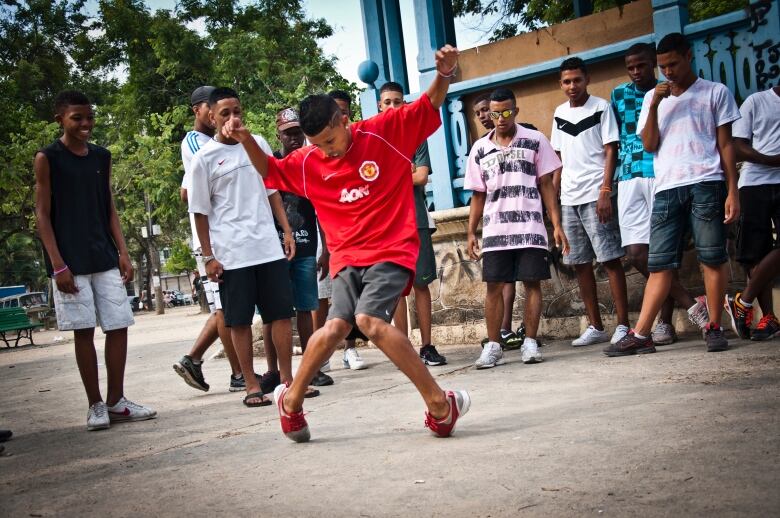
"It's controlled, but out-of-control at the same time," the 29-year-old says of his moves, sweat beading on his forehead. "It's what makes it so pleasurable to dance this way."
'You don't have to be a drug dealer'
Up in the hills, surrounded by some of the city's most stunning vistas and among ramshackle tin roof dwellings, the dance craze that matters is passinho. Literally "little step" in Portuguese, Felicio learned the passinho style during weekend "baile funk" parties inwhich music fusing Miami bass with African drum loops would throb from walls of amplifierssometimes stacked 4.5 metres high.
A passinho dance-off in Madureira Park, about an hour north of Rio. This footwork is pretty cray #Rio2016 pic.twitter.com/4Zmyn0I3W3
—@matt_kwongHere's some #passinho funk dancing slowed down. My feet hurt just watching this #Rio2016 pic.twitter.com/bMOqvAxdQ5
—@matt_kwongFelicio's gyrations represent Rio's urban franken-dance a cocktail of hip-hop, Angolan kuduro, funk, break and samba and born in the steep, labyrinthine slums that are home to some of this city's poorest people, its most violent drug gangs, and some of its most inspired creative types.
- CBC IN BRAZIL|Favela residentsdecry exclusion from Olympics
The1980sbrought funkCariocamusic to Brazil; the2000sgave way topassinho. Now, Rio's little step has made it to the big stage.Passinhohas emerged from an underground scene that was once more commonly linked to drug trafficking and criminality, to being showcased most recently inthe neon-splashed Olympic Opening Ceremony and emulated by American popstarsBeyonce as well as Chris Brown.
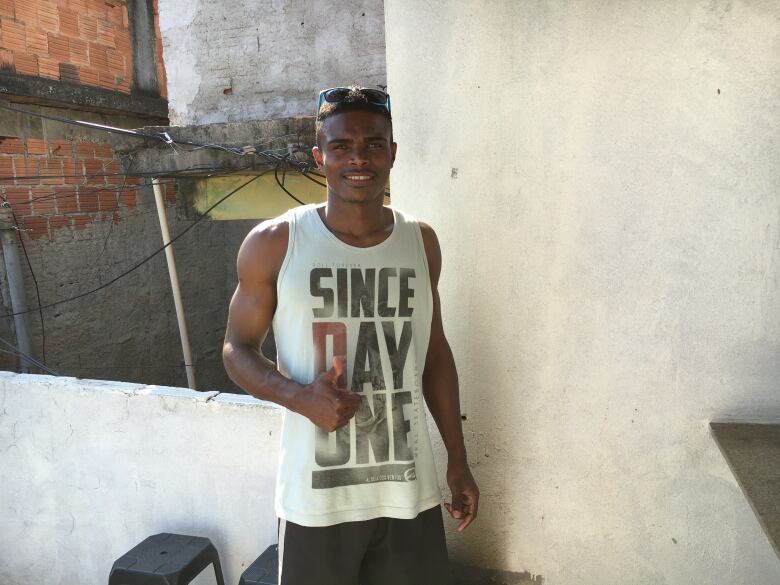
"Passinhois a refuge," Anderson DoNascimentosays in Portuguese. If you're a young man living in a "periphery," he says, "you don't have to be a drug dealer. You can choose passinho."
The resident of Morro da Providncia, the oldest favela in Rio, is amped up on a Saturday evening. He's competing in an organized Passinho Do Ouro funk battle in Parque Madureira, about an hour northwest of the city centre.
Waiting his turn to dance, he watches the all-female competition from the crowd.
"This is funk style!" he calls out in broken English, giving a thumbs-up.
The 22-year-old's talented footwork opened the way for him to get a spot onstage inside the hallowed Maracan soccer stadium, where he showcased funk-inspired choreography before hundreds of millions of viewers tuning in for the Olympics Opening Ceremony.
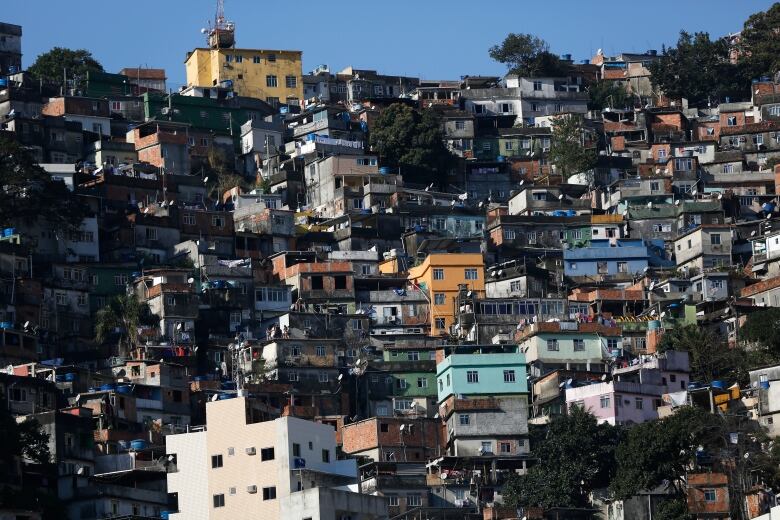
It was the culmination of months of rehearsals.
"That moment when you get on stage, and you hear them screaming, 'Brazil!' it was amazing for me," he says.
YouTube'phenomenon'
The Olympic dancing setpiece was an especially remarkable sight for some Rio residents, or Cariocas, who got to witnesscreative favela culture embraced by their nation and beamed out to the world in celebration at the Games.
Emlio Domingos, who filmed the rise of passinho for his2012documentary Batalha do Passinho, traces passinho mania back to a 2008 viral video from a birthday party in the neighbourhood of Engenho Da Rainha.
"That video was a turning point," he says of the two-minute clip, titled Passinho Foda. "That was the first passinho video to become a phenemenon."
Around that time, young dancers began uploading their own choreography to YouTube, trading moves virtually and adopting new styles by mimicking youths from other shantytowns.
Dance-offs promote peace
Even so, meeting for real-life battles remained restricted in some cases. A traffickermight not let residents fraternize with a neighbouring favela, for instance, because it was run by a competing gang.
"But passinho diminished the war between the residents between favelas," says 26-year-old passinho superstar Cebolinha, whose real name is Jefferson Chavez. "Before, residents sometimes couldn't go to a different favela, otherwise the residents might beat him."
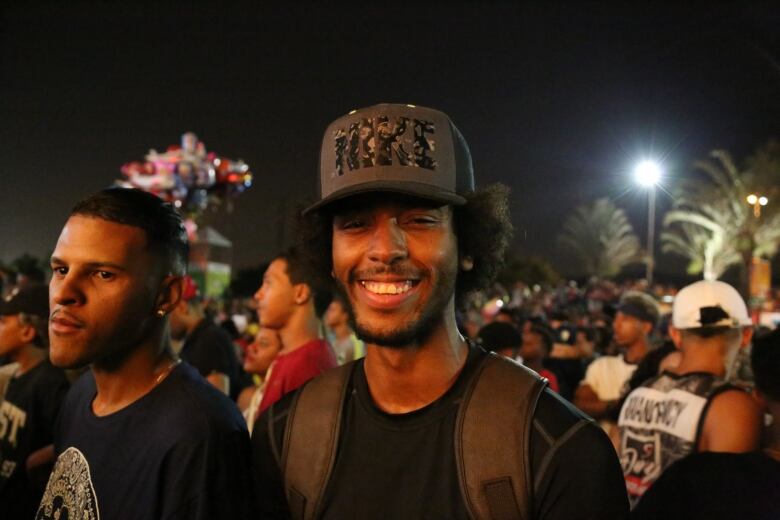
After the favela chieftains, or "traficantes," began sponsoring community dance-offs, followed by a wider King of Passinho tournament in 2011, local performers began to migrate between the slums to represent their home turf. It was the first time some of them were welcomed into nearby communities.
"They were respected and well-treated by the people from other favelas," Chavez says.
The 26-year-old from the Campinho favela is among the rare few to have achieved some fame from his dancing. He now makes his living primarily as a dancer, performing in shows, doing commercial work and teaching. In 2012, he made his first overseas trip to London to dance at the Paralympics Opening Ceremony. He was also invited to perform at New York's Lincoln Center at a premier for Domingos's documentary.
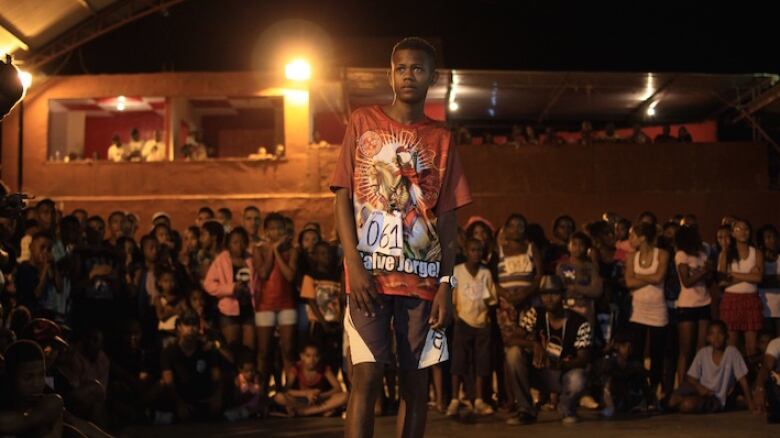
"Nowadays, I want to absorb the best that my body can give me with dance," he says, adding he wants to get a teaching degree so he can be a phys-ed instructor.
In Madureira, holding court as emcee for the batalha, Rafael Mike is another success story. As smoke from a fog machine drifts his way, Mike, a member of the elite Dream Team Do Passinho, brings up the next performer and instructs the DJ to cue the next track: "DJ, aperte o play!"
Dream Team have been featured in a 2014 Ricky Martin video for his Brazilian funk-inflected pop song Vida and have also scoreda clothing line partnership.
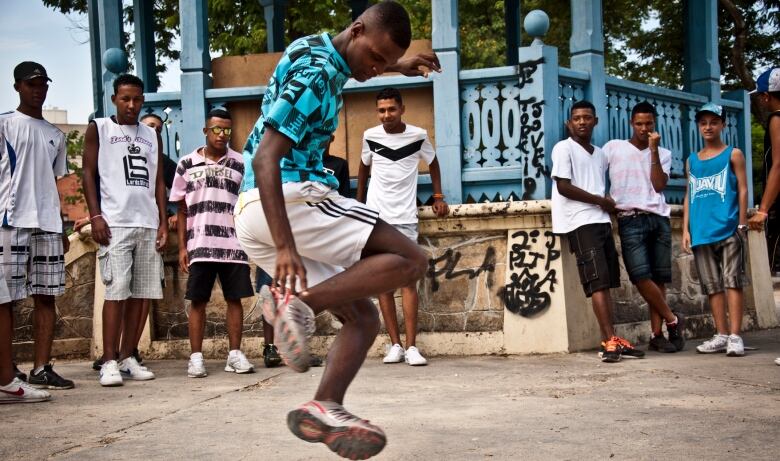
But Julio Ludemir, the community organizer who brought the first Rio crew to London for the 2012 Paralympic Opening Ceremony,warns thatpassinho is no easy ticket out of slum life. Many of the performers, even the well-known ones, still live in the favelas, or do odd jobs to survive.
In Providncia, the same favela where Olympic performer Nascimento lives and dreams of being lifted out of poverty by funk, Ludemirpoints toa starker reality one of misery that persists in the communities on the outskirts of Rio.
"Everybody wants to be Dream Team Do Passinho. They make success. But how many people in passinho can pay their bills dancing?" he asks.

Ludemir recalls a tournament not long ago when a boy was in the midst of a dance battle, demonstrating the same lightning-quick footwork, when the child suddenly collapsed around 5 p.m.
"Everybody was in despair because we thought he had a heart attack," he says.
Organizers realized he had fainted, having eaten nothing all day. He was starving. They fed him sugar and bread.
"Passinho created a new identity, but another thing is reality. We love Carioca way of life. But after passinho, what happens in my life?" Ludemir says. "Now I ask, is passinho a new Messiah?"













_(720p).jpg)


 OFFICIAL HD MUSIC VIDEO.jpg)
.jpg)



























































































